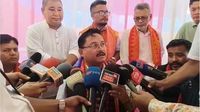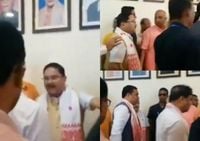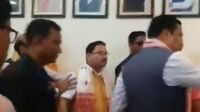In a dramatic display of intra-party tensions, Assam BJP President Dilip Saikia was caught on video shouting at state cabinet minister Jayanta Malla Baruah during a recent party event, an incident that has sparked widespread discussion and criticism. The confrontation occurred on April 13, 2025, at the inauguration of a new Mandal office in Bahjani, Nalbari district, where Chief Minister Himanta Biswa Sarma was also present.
The viral footage shows Saikia visibly agitated, pointing fingers at Baruah and reportedly instructing local party officials to remove the mandal president from the scene. This outburst came as Saikia expressed his frustration over not being allowed to enter the venue while both the Chief Minister and Baruah were already inside. According to sources, Saikia felt disrespected, believing that as the state party president, he should have been given priority at the event.
"Your constituency... disrespect to the president," Saikia was heard saying, although the full context of the exchange remains unclear. Following the confrontation, both CM Sarma and Baruah walked away from the scene, leaving Saikia to address the situation alone.
This incident has not only drawn attention to the internal dynamics of the Assam BJP but has also led to mockery from opposition parties, particularly the Congress. Assam Congress President Bhupen Borah commented on the altercation, suggesting it highlighted the rift between the party's traditional "RSS-loyalists" and newer members who may not adhere to the same ideological lines. In a social media post, Borah quipped, "Ram Ram, rebellion on 1st Bohag… SANGHI RAJ vs SYNDICATE RAJ." He further criticized Sarma, questioning his authority and respect within the party hierarchy.
In the wake of the viral video, Saikia addressed the media during a cultural program near the India-Bhutan border on April 17, where he emphasized the importance of discipline within the party. "To run a party, it is important to maintain discipline, and I will not compromise on this," he stated. Saikia insisted that the rules of the BJP apply equally to all members, from booth presidents to the Prime Minister and Chief Minister. He remarked, "There is a discipline in our party, and whether it is the chief minister or any other leader, all have to abide by the discipline."
Saikia's comments came as he launched a scathing attack on Bhupen Borah, branding him as the "leader of a syndicate" and accusing the Congress of perpetuating a culture of confusion rather than offering a clear vision for the state. He asserted, "Congress needs to learn from us. Bhupen Borah has failed to emerge as a credible leader in the eyes of the people. The party is no longer relevant in Assam’s political landscape."
The cultural program, titled "Bogajuliyao Boishaguni Dandiche," was part of the Rongjali Bihu celebrations and attracted significant local participation, showcasing the vibrancy of Assamese culture along the international border.
As the Assam BJP navigates this internal strife, the implications for the party's unity and future direction remain uncertain. Saikia, who has been involved with the BJP and RSS for nearly four decades, was appointed state BJP president earlier this year, positioning him as a key figure in the party's leadership.
In contrast, many of the party's prominent leaders, including Sarma and Baruah, have joined the BJP more recently, primarily from the Congress. This generational shift within the party may contribute to the tensions observed during the incident, as differing ideologies and loyalties come into play.
Political analysts suggest that the altercation could signify deeper fractures within the Assam BJP, potentially impacting its electoral strategies and public image ahead of upcoming elections. The party's ability to present a united front will be crucial as it faces challenges from both within and outside its ranks.
As the situation continues to unfold, the Assam BJP will need to address these internal conflicts effectively to maintain its standing in the state's political landscape. The events at the Bahjani Mandal office serve as a reminder of the complexities and challenges that political parties often face in managing their internal dynamics while striving for public support.







